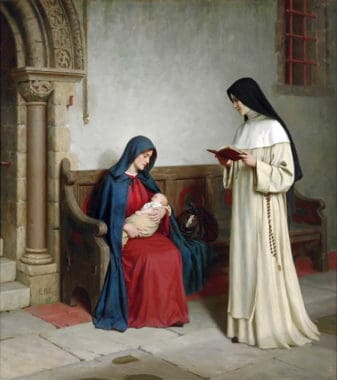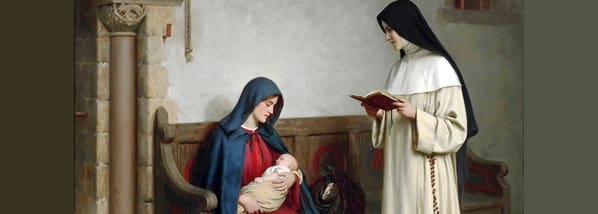Dear Father John, in The Foundations of Religious Life: Revisiting the Vision by the council of Major Superiors of Women Religious I came across something I was hoping someone could possibly shed a bit more light on. I’m aware that this is a conversation that may not have yet taken place in any official form. On pages 32-33 in speaking on the public vows of consecrated religious it is stated:  “Perpetual profession creates a definitive bond between Christ and the person who is consecrated as a religious, manifesting in the Church a wonderful marriage brought about by God. This bond reaches to the soul of the person; the characteristic of perpetuity implies that there is a lasting effect upon the soul of the religious.” What would be the difference in this case of a “lasting effect on the soul” and an indelible mark? What is the teaching around the effects on the soul of religious profession in comparison to other vocations (priesthood and marriage)?
“Perpetual profession creates a definitive bond between Christ and the person who is consecrated as a religious, manifesting in the Church a wonderful marriage brought about by God. This bond reaches to the soul of the person; the characteristic of perpetuity implies that there is a lasting effect upon the soul of the religious.” What would be the difference in this case of a “lasting effect on the soul” and an indelible mark? What is the teaching around the effects on the soul of religious profession in comparison to other vocations (priesthood and marriage)?
In our last post, we looked at what sacramental character is, what the catechism has to say about this and the effects on the soul that comes from the grace received in various sacraments. Today, we will look specifically on how religious profession affects the soul. As I said in the first half of this series, these concepts touch on deep mysteries regarding the working of God’s grace, which we cannot fully comprehend. Accepting them as true in faith, with the help of the Holy Spirit’s gifts of understanding, knowledge, and wisdom, we can gradually deepen our appreciation and grasp of them. My hope is to point to some explanations that can stimulate your further reflection and prayer.
The Effect on the Soul of Religious Profession
Now we are ready to reflect briefly on the “lasting effect on the soul” that comes with a religious profession. Religious profession is not one of the sacraments. Therefore, no sacramental grace is involved. God has no need to elevate this person’s soul through giving another sacramental character. Rather, a religious profession is a particular flowering or development of the Christian identity already received by the person through Baptism and Confirmation. It is, in a sense, the fruit being borne from those sacramental graces that this person already received. Here is how the Catechism refers to it:
931 Already dedicated to him through Baptism, the person who surrenders himself to the God he loves above all else thereby consecrates himself more intimately to God’s service and to the good of the Church.
You can see that the effect upon the soul, therefore, of religious profession, flows from the free decision of the person to respond to a special call to life for God alone. Like marriage, this effect flows from the fact of the individual freely consenting to this life-long commitment. This supreme exercise of one’s spiritual freedom changes the soul only through binding it more closely to God. Of course, to make this commitment, someone does need a special grace from God – a calling or a vocation. In a certain way, this calling also has an effect on the soul: it opens the soul to the possibility of making this radical consecration of one’s entire life. But it doesn’t impart a new character to the soul; the character was already imparted at baptism. Here’s how St. John Paul II expressed it in his Post-Synodal Apostolic Exhortation on the consecrated life, Vita Consecrata (highly recommended reading for a deeper understanding of religious profession and the religious state of life):
[30] In the Church’s tradition religious profession is considered to be a special and fruitful deepening of the consecration received in Baptism, inasmuch as it is the means by which the close union with Christ already begun in Baptism develops in the gift of a fuller, more explicit and authentic configuration to him through the profession of the evangelical counsels. This further consecration, however, differs in a special way from baptismal consecration, of which it is not a necessary consequence.
The purpose of this state of life is to give an especially eloquent testimony, in every period of the Church’s history, of the way of life that Christ chose for himself. This testimony bolsters and nourishes the life of the Church. To quote St. John Paul II again:
[20] The consecrated life, through the prompting of the Holy Spirit, constitutes a closer imitation and an abiding re-enactment in the Church of the way of life which Jesus, the supreme Consecrated One and missionary of the Father for the sake of his Kingdom, embraced and proposed to his disciples.
[32] As a way of showing forth the Church’s holiness, it is to be recognized that the consecrated life, which mirrors Christ’s own way of life, has an objective superiority. Precisely for this reason, it is an especially rich manifestation of Gospel values and a more complete expression of the Church’s purpose, which is the sanctification of humanity.
In short, certain graces and certain free decisions can have a lasting effect on the soul, even though that effect is not sacramental. This is a reflection of the power of human freedom, which many Christian philosophers have described as the power of “self-determination.” When we make a lifelong commitment, it has an effect not only on what happens to us in the future, but on our very identity, on the kind of person we are.
I am certain that this explanation didn’t completely satisfy you. These realities are so rich and lofty that it is impossible to comprehend them completely, as I mentioned at the beginning. And a lot more could be said. But I hope that these reflections have at least given you a bit more light, and pointed you towards some avenues for further reading and reflection.
God bless you! Fr. John
Art: Maternity, Edmund Blair Leighton, 1917, Restored Traditions, used with permission.


